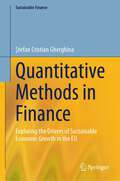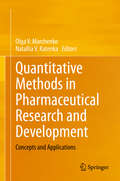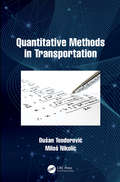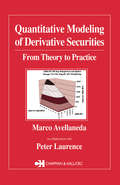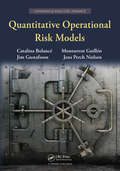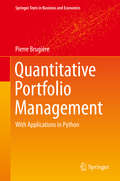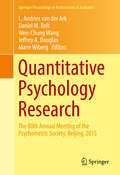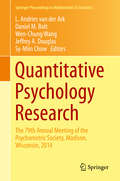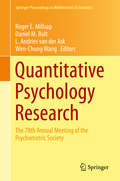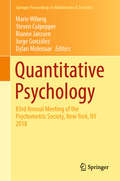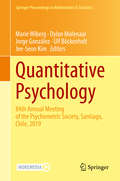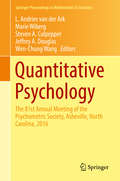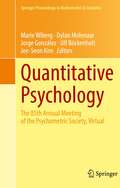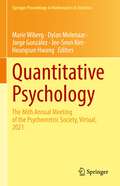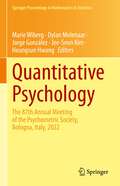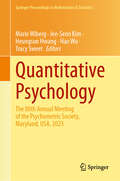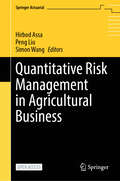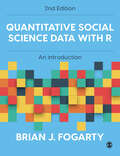- Table View
- List View
Quantitative Methods in Finance: Exploring the Drivers of Sustainable Economic Growth in the EU (Sustainable Finance)
by Ştefan Cristian GherghinaThis book explores certain social and environmental drivers of sustainable economic growth for European Union countries (EU-27) and United Kingdom (UK) in the context of the UN 2030 Agenda for Sustainable Development. The author provides a comprehensive overview of the factors that impact and facilitate sustainable economic growth and discusses the complex set of factors involved in sustainable economic development. Special attention is given to quantitative frameworks and empirical modelling, with the main focus on panel data regression models and vector error correction model approach. Furthermore, the book develops ratings of sustainable economic growth for each of the explored countries, by employing data mining techniques such as principal component analysis. Also, the data envelopment analysis non-parametric methodology towards assessing sustainable economic growth is investigated, as well as the cluster analysis in order to classify the selected nations according to sustainable economic growth. The book appeals to policy-makers and academics targeting to learn more about the characteristics of sustainable economic growth.
Quantitative Methods in Pharmaceutical Research and Development: Concepts and Applications
by Olga V. Marchenko Natallia V. KatenkaThis contributed volume presents an overview of concepts, methods, and applications used in several quantitative areas of drug research, development, and marketing. Chapters bring together the theories and applications of various disciplines, allowing readers to learn more about quantitative fields, and to better recognize the differences between them. Because it provides a thorough overview, this will serve as a self-contained resource for readers interested in the pharmaceutical industry, and the quantitative methods that serve as its foundation. Specific disciplines covered include:BiostatisticsPharmacometricsGenomicsBioinformaticsPharmacoepidemiologyCommercial analyticsOperational analyticsQuantitative Methods in Pharmaceutical Research and Development is ideal for undergraduate students interested in learning about real-world applications of quantitative methods, and the potential career options open to them. It will also be of interest to experts working in these areas.
Quantitative Methods in Transportation
by Dušan Teodorović Miloš NikolićQuantitative Methods in Transportation provides the most useful, simple, and advanced quantitative techniques for solving real-life transportation engineering problems. It aims to help transportation engineers and analysts to predict travel and freight demand, plan new transportation networks, and develop various traffic control strategies that are safer, more cost effective, and greener. Transportation networks can be exceptionally large, and this makes many transportation problems combinatorial, and the challenges are compounded by the stochastic and independent nature of trip-planners decision making. Methods outlined in this book range from linear programming, multi-attribute decision making, data envelopment analysis, probability theory, and simulation to computer techniques such as genetic algorithms, simulated annealing, tabu search, ant colony optimization, and bee colony optimization. The book is supported with problems and has a solutions manual to aid course instructors.
Quantitative Modeling of Derivative Securities: From Theory To Practice
by Peter LaurenceQuantitative Modeling of Derivative Securities demonstrates how to take the basic ideas of arbitrage theory and apply them - in a very concrete way - to the design and analysis of financial products. Based primarily (but not exclusively) on the analysis of derivatives, the book emphasizes relative-value and hedging ideas applied to different financial instruments. Using a ""financial engineering approach,"" the theory is developed progressively, focusing on specific aspects of pricing and hedging and with problems that the technical analyst or trader has to consider in practice.More than just an introductory text, the reader who has mastered the contents of this one book will have breached the gap separating the novice from the technical and research literature.
Quantitative Models for Microscopic to Macroscopic Biological Macromolecules and Tissues
by Luis Olivares-Quiroz Osbaldo Resendis-AntonioThis book presents cutting-edge research on the use of physical and mathematical formalisms to model and quantitatively analyze biological phenomena ranging from microscopic to macroscopic systems. The systems discussed in this compilation cover protein folding pathways, gene regulation in prostate cancer, quorum sensing in bacteria to mathematical and physical descriptions to analyze anomalous diffusion in patchy environments and the physical mechanisms that drive active motion in large sets of particles, both fundamental descriptions that can be applied to different phenomena in biology. All chapters are written by well-known experts on their respective research fields with a vast amount of scientific discussion and references in order the interested reader can pursue a further reading. Given these features, we consider Quantitative Models for Microscopic to Macroscopic Biological Macromolecules and Tissues as an excellent and up-to-date resource and reference for advanced undergraduate students, graduate students and junior researchers interested in the latest developments at the intersection of physics, mathematics, molecular biology, and computational sciences. Such research field, without hesitation, is one of the most interesting, challenging and active of this century and the next.
Quantitative Operational Risk Models (Chapman & Hall/CRC Finance Series)
by Catalina Bolance Montserrat Guillén Jim Gustafsson Jens Perch NielsenUsing real-life examples from the banking and insurance industries, Quantitative Operational Risk Models details how internal data can be improved based on external information of various kinds. Using a simple and intuitive methodology based on classical transformation methods, the book includes real-life examples of the combination of internal dat
Quantitative Portfolio Management: with Applications in Python (Springer Texts in Business and Economics)
by Pierre BrugièreThis self-contained book presents the main techniques of quantitative portfolio management and associated statistical methods in a very didactic and structured way, in a minimum number of pages. The concepts of investment portfolios, self-financing portfolios and absence of arbitrage opportunities are extensively used and enable the translation of all the mathematical concepts in an easily interpretable way. All the results, tested with Python programs, are demonstrated rigorously, often using geometric approaches for optimization problems and intrinsic approaches for statistical methods, leading to unusually short and elegant proofs. The statistical methods concern both parametric and non-parametric estimators and, to estimate the factors of a model, principal component analysis is explained. The presented Python code and web scraping techniques also make it possible to test the presented concepts on market data. This book will be useful for teaching Masters students and for professionals in asset management, and will be of interest to academics who want to explore a field in which they are not specialists. The ideal pre-requisites consist of undergraduate probability and statistics and a familiarity with linear algebra and matrix manipulation. Those who want to run the code will have to install Python on their pc, or alternatively can use Google Colab on the cloud. Professionals will need to have a quantitative background, being either portfolio managers or risk managers, or potentially quants wanting to double check their understanding of the subject.
Quantitative Psychology Research
by Wen-Chung Wang L. Andries van der Ark Daniel M. Bolt Jeffrey A. Douglas Marie WibergThe research articles in this volume cover timely quantitative psychology topics, including new methods in item response theory, computerized adaptive testing, cognitive diagnostic modeling, and psychological scaling. Topics within general quantitative methodology include structural equation modeling, factor analysis, causal modeling, mediation, missing data methods, and longitudinal data analysis. These methods will appeal, in particular, to researchers in the social sciences. The 80th annual meeting took place in Beijing, China, between the 12th and 16th of July, 2014. Previous volumes to showcase work from the Psychometric Society's Meeting are New Developments in Quantitative Psychology: Presentations from the 77th Annual Psychometric Society Meeting (Springer, 2013), Quantitative Psychology Research: The 78th Annual Meeting of the Psychometric Society (Springer, 2015), and Quantitative Psychology Research: The 79th Annual Meeting of the Psychometric Society, Wisconsin, USA, 2014 (Springer, 2015).
Quantitative Psychology Research
by Wen-Chung Wang L. Andries van der Ark Daniel M. Bolt Jeffrey A. Douglas Sy-Miin ChowThese research articles from the 79th Annual Meeting of the Psychometric Society (IMPS) cover timely quantitative psychology topics, including new methods in item response theory, computerized adaptive testing, cognitive diagnostic modeling, and psychological scaling. Topics within general quantitative methodology include structural equation modeling, factor analysis, causal modeling, mediation, missing data methods, and longitudinal data analysis. These methods will appeal, in particular, to researchers in the social sciences. The 79th annual meeting took place in Madison, WI between July 21nd and 25th, 2014. Previous volumes to showcase work from the Psychometric Society's Meeting are New Developments in Quantitative Psychology: Presentations from the 77th Annual Psychometric Society Meeting (Springer, 2013) and Quantitative Psychology Research: The 78th Annual Meeting of the Psychometric Society (Springer, 2015).
Quantitative Psychology Research
by Wen-Chung Wang L. Andries van der Ark Daniel M. Bolt Roger E. MillsapThe 78th Annual Meeting of the Psychometric Society (IMPS) builds on the Psychometric Society's mission to share quantitative methods relevant to psychology. The chapters of this volume present cutting-edge work in the field. Topics include studies of item response theory, computerized adaptive testing, cognitive diagnostic modeling, and psychological scaling. Additional psychometric topics relate to structural equation modeling, factor analysis, causal modeling, mediation, missing data methods, and longitudinal data analysis, among others. The papers in this volume will be especially useful for researchers in the social sciences who use quantitative methods. Prior knowledge of statistical methods is recommended. The 78th annual meeting took place in Arnhem, The Netherlands between July 22nd and 26th, 2013. The previous volume to showcase work from the Psychometric Society's Meeting is New Developments in Quantitative Psychology: Presentations from the 77th Annual Psychometric Society Meeting (Springer, 2014).
Quantitative Psychology: 83rd Annual Meeting of the Psychometric Society, New York, NY 2018 (Springer Proceedings in Mathematics & Statistics #265)
by Marie Wiberg Jorge González Steven Culpepper Rianne Janssen Dylan MolenaarThis proceedings volume highlights the latest research and developments in psychometrics and statistics. This book compiles and expands on selected and peer reviewed presentations given at the 83rd Annual International Meeting of the Psychometric Society (IMPS), organized by Columbia University and held in New York, USA July 9th to 13th, 2018.The IMPS is one of the largest international meetings on quantitative measurement in education, psychology and the social sciences. The last couple of years it has attracted more than 500 participants and more than 250 paper presentations from researchers around the world.Leading experts in the world and promising young researchers have written the 38 chapters. The chapters address a large variety of topics including but not limited to item response theory, multistage adaptive testing, and cognitive diagnostic models. This volume is the 7th in a series of recent volumes to cover research presented at the IMPS.
Quantitative Psychology: 84th Annual Meeting of the Psychometric Society, Santiago, Chile, 2019 (Springer Proceedings in Mathematics & Statistics #322)
by Marie Wiberg Jorge González Dylan Molenaar Ulf Böckenholt Jee-Seon KimThis proceedings volume highlights the latest research and developments in psychometrics and statistics. It represents selected and peer reviewed presentations given at the 84th Annual International Meeting of the Psychometric Society (IMPS), organized by Pontificia Universidad Católica de Chile and held in Santiago, Chile during July 15th to 19th, 2019.The IMPS is one of the largest international meetings on quantitative measurement in education, psychology and the social sciences. It draws approximately 500 participants from around the world, featuring paper and poster presentations, symposiums, workshops, keynotes, and invited presentations.Leading experts and promising young researchers have written the included chapters. The chapters address a large variety of topics including but not limited to item response theory, multistage adaptive testing, and cognitive diagnostic models. This volume is the 8th in a series of recent volumes to cover research presented at the IMPS.
Quantitative Psychology: The 81st Annual Meeting Of The Psychometric Society, Asheville, North Carolina 2016 (Springer Proceedings in Mathematics & Statistics #196)
by Marie Wiberg Jorge González Steven Culpepper Rianne Janssen Dylan MolenaarThis proceedings book highlights the latest research and developments in psychometrics and statistics. Featuring contributions presented at the 82nd Annual Meeting of the Psychometric Society (IMPS), organized by the University of Zurich and held in Zurich, Switzerland from July 17 to 21, 2017, its 34 chapters address a diverse range of psychometric topics including item response theory, factor analysis, causal inference, Bayesian statistics, test equating, cognitive diagnostic models and multistage adaptive testing. The IMPS is one of the largest international meetings on quantitative measurement in psychology, education and the social sciences, attracting over 500 participants and 250 paper presentations from around the world every year. This book gathers the contributions of selected presenters, which were subsequently expanded and peer-reviewed.
Quantitative Psychology: The 81st Annual Meeting Of The Psychometric Society, Asheville, North Carolina 2016 (Springer Proceedings in Mathematics & Statistics #196)
by Wen-Chung Wang L. Andries van der Ark Jeffrey A. Douglas Marie Wiberg Steven A. CulpepperThis proceedings volume compiles and expands on selected and peer reviewed presentations given at the 81st Annual Meeting of the Psychometric Society (IMPS), organized by the University of North Carolina at Greensboro, and held in Asheville, North Carolina, July 11th to 17th, 2016. IMPS is one of the largest international meetings focusing on quantitative measurement in psychology, education, and the social sciences, both in terms of participants and number of presentations. The meeting built on the Psychometric Society's mission to share quantitative methods relevant to psychology, addressing a diverse set of psychometric topics including item response theory, factor analysis, structural equation modeling, time series analysis, mediation analysis, cognitive diagnostic models, and multi-level models. Selected presenters were invited to revise and expand their contributions and to have them peer reviewed and published in this proceedings volume. Previous volumes to showcase work from the Psychometric Society's meetings are New Developments in Quantitative Psychology: Presentations from the 77th Annual Psychometric Society Meeting (Springer, 2013), Quantitative Psychology Research: The 78th Annual Meeting of the Psychometric Society (Springer, 2015), Quantitative Psychology Research: The 79th Annual Meeting of the Psychometric Society, Madison, Wisconsin, 2014 (Springer, 2015), and Quantitative Psychology Research: The 80th Annual Meeting of the Psychometric Society, Beijing, 2015 (Springer, 2016).
Quantitative Psychology: The 85th Annual Meeting of the Psychometric Society, Virtual (Springer Proceedings in Mathematics & Statistics #353)
by Marie Wiberg Jorge González Dylan Molenaar Ulf Böckenholt Jee-Seon KimThis proceedings volume highlights the latest research and developments in psychometrics and statistics. It represents selected and peer-reviewed presentations given at the 85th Annual International Meeting of the Psychometric Society (IMPS), held virtually on July 13-17, 2020. The IMPS is one of the largest international meetings on quantitative measurement in education, psychology and the social sciences. It draws approximately 500 participants from around the world, featuring paper and poster presentations, symposiums, workshops, keynotes, and invited presentations. Leading experts and promising young researchers have written the included chapters. The chapters address a wide variety of topics including but not limited to item response theory, adaptive testing, Bayesian estimation, propensity scores, and cognitive diagnostic models. This volume is the 9th in a series of recent works to cover research presented at the IMPS.
Quantitative Psychology: The 86th Annual Meeting of the Psychometric Society, Virtual, 2021 (Springer Proceedings in Mathematics & Statistics #393)
by Marie Wiberg Jorge González Dylan Molenaar Heungsun Hwang Jee-Seon KimThe volume represents presentations given at the 86th annual meeting of the Psychometric Society, held virtually on July 19–23, 2021. About 500 individuals contributed paper presentations, symposiums, poster presentations, pre-conference workshops, keynote presentations, and invited presentations. Since the 77th meeting, Springer has published the conference proceedings volume from this annual meeting to allow presenters to share their work and ideas with the wider research community, while still undergoing a thorough review process. This proceedings covers a diverse set of psychometric topics, including item response theory, Bayesian models, reliability, longitudinal measures, and cognitive diagnostic models.
Quantitative Psychology: The 87th Annual Meeting of the Psychometric Society, Bologna, Italy, 2022 (Springer Proceedings in Mathematics & Statistics #422)
by Marie Wiberg Jorge González Dylan Molenaar Heungsun Hwang Jee-Seon KimThe volume represents presentations given at the 87th annual meeting of the Psychometric Society, held in Bologna, Italy at July 11–15, 2022. The proceedings cover a diverse set of psychometric topics, including item response theory, Bayesian models, reliability, latent variable models, causal inference, and cognitive diagnostic models.
Quantitative Psychology: The 88th Annual Meeting of the Psychometric Society, Maryland, USA, 2023 (Springer Proceedings in Mathematics & Statistics #452)
by Marie Wiberg Jee-Seon KimThis book includes presentations given at the 88th annual meeting of the Psychometric Society, held in Maryland, USA on July 24–28, 2023. The proceeding covers a diverse set of psychometric topics. The topics include, but are not limited to item response theory, cognitive diagnostic models, Bayesian estimation, validity and reliability issues, and several applications within different fields. The authors are from all over the world, they work in different psychometrics areas, as well as having diverse professional and academic experiences.
Quantitative Reasoning in Mathematics and Science Education (Mathematics Education in the Digital Era #21)
by Patrick W. Thompson Gülseren Karagöz Akar İsmail Özgür Zembat Selahattin ArslanThis book focuses on quantitative reasoning as an orienting framework to analyse learning, teaching and curriculum in mathematics and science education. Quantitative reasoning plays a vital role in learning concepts foundational to arithmetic, algebra, calculus, geometry, trigonometry and other ideas in STEM. The book draws upon the importance of quantitative reasoning and its crucial role in education. It particularly delves into quantitative reasoning related to the learning and teaching diverse mathematics and science concepts, conceptual analysis of mathematical and scientific ideas and analysis of school mathematics (K-16) curricula in different contexts. We believe that it can be considered as a reference book to be used by researchers, teacher educators, curriculum developers and pre- and in-service teachers.
Quantitative Reasoning: Thinking in Numbers
by Eric ZaslowIs college worth the cost? Should I worry about arsenic in my rice? Can we recycle pollution? Real questions of personal finance, public health, and social policy require sober, data-driven analyses. This unique text provides students with the tools of quantitative reasoning to answer such questions. The text models how to clarify the question, recognize and avoid bias, isolate relevant factors, gather data, and construct numerical analyzes for interpretation. Themes and techniques are repeated across chapters, with a progression in mathematical sophistication over the course of the book, which helps the student get comfortable with the process of thinking in numbers. This textbook includes references to source materials and suggested further reading, making it user-friendly for motivated undergraduate students. The many detailed problems and worked solutions in the text and extensive appendices help the reader learn mathematical areas such as algebra, functions, graphs, and probability. End-of-chapter problem material provides practice for students, and suggested projects are provided with each chapter. A solutions manual is available online for instructors.
Quantitative Rechenverfahren der Theoretischen Chemie: Ein Einstieg in Hartree-Fock, Configuration Interaction und Dichtefunktionale (essentials)
by Daniel PüschnerDaniel Püschner stellt sowohl grundlegende Methoden der Computerchemie als auch heute genutzte moderne Methoden wie Coupled Cluster und die Dichtefunktionaltheorie vor. Mithilfe der Wellenfunktionstheorie wird in diesem essential gezeigt, wie die Energie eines Systems berechnet werden kann. Anschließend geht der Autor auf die Probleme der behandelten Methoden ein und zeigt, wie diese systematisch behoben werden können. Insbesondere in der Forschung ist die Computerchemie heutzutage nicht mehr wegzudenken. Obwohl die meisten Eigenschaften auch experimentell zugänglich sind, können Ergebnisse aus quantenmechanischen Rechnungen dabei helfen, die experimentellen Ergebnisse zu verstehen und zu interpretieren. Ein grundlegendes Verständnis ist daher auch für Experimentalchemiker unerlässlich, weshalb im Rahmen des Chemiestudiums die Grundlagen der Theoretischen Chemie behandelt werden. Für dieses essential werden Grundkenntnisse in den Bereichen der Mathematik und der Theoretischen Chemie ebenfalls vorausgesetzt.
Quantitative Research in Education: A Primer
by Wayne K. Hoy Curt M. Adams"The book provides a reference point for beginning educational researchers to grasp the most pertinent elements of designing and conducting research…" —Megan Tschannen-Moran, The College of William & Mary Quantitative Research in Education: A Primer, Second Edition is a brief and practical text designed to allay anxiety about quantitative research. Award-winning authors Wayne K. Hoy and Curt M. Adams first introduce readers to the nature of research and science, and then present the meaning of concepts and research problems as they dispel notions that quantitative research is too difficult, too theoretical, and not practical. Rich with concrete examples and illustrations, the Primer emphasizes conceptual understanding and the practical utility of quantitative methods while teaching strategies and techniques for developing original research hypotheses. The Second Edition includes suggestions for empirical investigation and features a new section on self-determination theory, examples from the latest research, a concluding chapter illustrating the practical applications of quantitative research, and much more. This accessible Primer is perfect for students and researchers who want a quick understanding of the process of scientific inquiry and who want to learn how to effectively create and test ideas.
Quantitative Research in Education: A Primer
by Wayne K. Hoy Curt M. Adams"The book provides a reference point for beginning educational researchers to grasp the most pertinent elements of designing and conducting research…" —Megan Tschannen-Moran, The College of William & Mary Quantitative Research in Education: A Primer, Second Edition is a brief and practical text designed to allay anxiety about quantitative research. Award-winning authors Wayne K. Hoy and Curt M. Adams first introduce readers to the nature of research and science, and then present the meaning of concepts and research problems as they dispel notions that quantitative research is too difficult, too theoretical, and not practical. Rich with concrete examples and illustrations, the Primer emphasizes conceptual understanding and the practical utility of quantitative methods while teaching strategies and techniques for developing original research hypotheses. The Second Edition includes suggestions for empirical investigation and features a new section on self-determination theory, examples from the latest research, a concluding chapter illustrating the practical applications of quantitative research, and much more. This accessible Primer is perfect for students and researchers who want a quick understanding of the process of scientific inquiry and who want to learn how to effectively create and test ideas.
Quantitative Risk Management in Agricultural Business (Springer Actuarial)
by Peng Liu Hirbod Assa Simon WangThis open access volume explores the cutting edge of quantitative methods in agricultural risk management and insurance. Composed of insightful articles authored by field experts, focusing on innovation, recent advancements, and the use of technology and data sciences, it bridges the gap between theory and practice through empirical studies, concrete examples and case analyses. Evolving challenges in risk management have called for the development of new, groundbreaking models. Beyond presenting the theoretical foundations of these models, this book discusses their real-world applications, providing tangible insights into how innovative modeling can elevate risk management strategies in the agricultural sector. The latest risk management tools incorporate novel concepts such as index insurance, price index risk management frameworks and risk pools. The practical implications of these approaches are investigated, and their impact on contemporary agricultural risk mitigation and insurance practices is examined. Field experiences illustrate the implementation of these tools and their resulting outcomes. Modern data analysis techniques in agricultural risk and insurance include machine learning, spatial analysis, text analysis, and deep learning. In addition to scrutinizing these ideas, the authors introduce an economic perspective towards risk, highlighting areas that have developed thanks to technological progress. Examples illustrate how these combined methodologies contribute to informed decision-making in agriculture, and their potential benefits and challenges are considered. This carefully compiled volume will be a valuable reference for researchers, practitioners, and students intrigued by the dynamic intersection of agricultural risk management and insurance practices.
Quantitative Social Science Data with R: An Introduction
by Brian J FogartyRelevant, engaging, and packed with student-focused learning features, this book provides the basic step-by-step introduction to quantitative research and data every student needs. Gradually introducing applied statistics and the language and functionality of R and R Studio software, it uses examples from across the social sciences to show students how to apply abstract statistical and methodological principles to their own work. Maintaining a student-friendly pace, it goes beyond a normal introductory statistics book and shows students where data originates and how to: - Understand and use quantitative data to answer questions - Approach surrounding ethical issues - Collect quantitative data - Manage, write about, and share the data effectively Supported by incredible digital resources with online tutorials, videos, datasets, and multiple choice questions, this book gives students not only the tools they need to understand statistics, quantitative data, and R software, but also the chance to practice and apply what they have learned.
